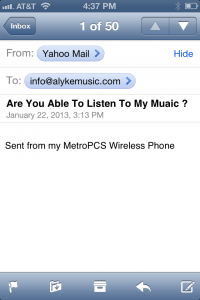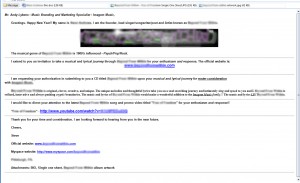This is part 3 of a four part series on treating your career in the music business or as a professional musician like an entrepreneur.
Click here for Part 1 – Being A Music Industry Entrepreneur
Click here for Part 2 – Goal Setting in the Music Industry
Click here to register for the newsletter to be sure you don’t miss out on the rest of the series…
Crafting a plan for any music industry project is key. It allows you to materialize an action plan, gives you a tangible list of tasks that act as a checklist and can present to potential partners, and allows you to lay out risks and pitfalls in order to nip problems in the bud.
The key element to ANY music business plan starts with your end goal in mind. We talked about setting goals in the last newsletter so if you missed it, click here. Clearly state the specific goal you have and then list a few of the positive outcomes it will create. Your goal can include acquiring new fans, creating a fanbase mailing list, getting in touch with music supervisors about music licensing opportunities, or even your next EP or album project. Let’s use creating a mailing list as an example.
Example: Create a mailing list based on email addresses acquired at live shows of at least 50 fans over the next 4 gigs.
Once you have your goal stated clearly, you can then consider the steps it might take in order to achieve the goal:
- Register for an email service
- Research and choose a way to collect emails at gigs (ie: apps, sign-in sheet at door, collect after the show)
- Outreach to local venues to get more gigs
- Write, edit, and practice mic banter for asking for emails at gig
- Create 4 emails to be sent to the list, 1 per week for the next month
- Promote email list sign-up via social media and website
Your list might look very different than mine for this particular project, but you get the idea. You’ve got a goal, you’ve got action steps. An excellent start to any plan. What’s next? Adding a deadline of course!
We already know we want to populate the list with at least 50 people over the course of 4 gigs. We can take this 1 step further by adding something like “or in 1 month, whichever comes first” (although, without a live gig it might be tough to populate an email list).
Then take a look at your other tasks, and work them into that time frame. Once you’ve got it planned set calendar reminders on your phone or laptop, write it down on a calendar near wherever you work, or just refer to it in the plan anytime you boot-up your computer. I will say here it is DEFINITELY a good idea to have it in front of you physically and having your phone beep at you once in a while so you don’t lose sight of your project.
Great! We’ve got our goal, our plan, our schedule, what could go wrong? Exactly! That’s what’s next. Let’s try and come up with as many things that can go wrong along with at least 1 solution for each. It might look something like this:
- Band member has to leave town – get a back-up player for each band member lined up for gigs
- After 1st gig, email collection is poor – consider giving away an EP or band sticker in exchange for an email sign-up
- Not able to get more than 1 or 2 gigs – ask some other musicians about getting an introduction to a venue booker in order to facilitate getting a gig
Again, your solutions and dilemmas may look different than this, but the key is to find reasons why you CAN achieve the goal despite setbacks. This helps break barriers. Again keep in mind, you won’t find the BEST process for goal-planning immediately. It will take time to learn how long it takes to do things, and what things work best as far as accomplishing certain goals. Once you find some processes that work for you, iterating the process and tweaking it to increase your success rate.
Whatever you do, remember to craft a plan, and get started. You may not hit your mark exactly at first, but like we said in the last email, there really is no such thing as failing. Learning, improving, and tweaking is all part of the process.



 One final point: It comes down to how many people are going to see a project, and how much you value your music, the exposure, and the project itself. If someone wants to license your song for all-media, worldwide in perpetuity (which I would HIGHLY advise against unless you’re running a music library), they’re anticipating a lot of people are going to see it. This means the exposure is high, which is great, but they’re also asking for a lot of rights which means it should be a cost consideration vs. the history of your song.
One final point: It comes down to how many people are going to see a project, and how much you value your music, the exposure, and the project itself. If someone wants to license your song for all-media, worldwide in perpetuity (which I would HIGHLY advise against unless you’re running a music library), they’re anticipating a lot of people are going to see it. This means the exposure is high, which is great, but they’re also asking for a lot of rights which means it should be a cost consideration vs. the history of your song.